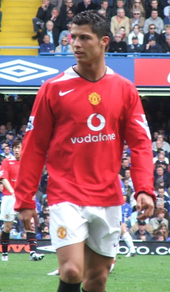In June 2002, Ferguson appointed Carlos Queiroz as his new assistant.[119] The recommendation came from Andy Roxburgh, at a time when United began scouting for southern-hemisphere footballers and wanted a multilingual coach. Ferguson was so impressed with Queiroz after their first meeting, he offered him the job "right away". In July 2002 United paid £29.3 million for Leeds United defender Rio Ferdinand. The club broke the British transfer record once more, though this did not concern Ferguson: "We have the right to try and improve ourselves and there's nothing wrong with that."[120]
The 2002–03 season began rather poorly for United; the club made its worst start to a league campaign in 13 years.[121] In a column for The Daily Telegraph, Hansen said Ferguson "will recognise this difficult start to the season for what it is: the greatest challenge of his career."[122] Ferguson's response was typically bullish:
I don't get paid to panic. We have had plenty of stuttering starts. My greatest challenge is not what's happening at the moment. My greatest challenge was knocking Liverpool right off their fucking perch. And you can print that.[123]
Several players were sent away for surgery in this period, a "minor gamble" Ferguson took in the hope they would return energised. Defeats, such as the one to Manchester City at Maine Road in November 2002, forced United to change their playing style. The team "moved the ball forward more and quicker rather than concentrating on possession ratios," and the coaching staff tried accommodating Forlán with Van Nistelrooy, before settling with Scholes. United's league form improved as the season went on despite defeat by Liverpool in the 2003 Football League Cup Final and they overhauled Arsenal to win the Premier League for an eighth time in May 2003.[124] The team was eliminated in the Champions League quarter-final to Real Madrid over two legs; Ferguson described the second match, a 4–3 win at Old Trafford as "epic".
After a season at United, Queiroz left to manage Real Madrid in June 2003.[125] Ferguson anticipated his deputy would return – "Three months later, he was wanting to quit Madrid," and for that reason did not appoint a replacement. In the summer, Beckham also moved to Real Madrid, while Verón joined Chelsea. United in the meantime rebuilt their team; Tim Howard replaced Barthez in goal and Kléberson, Eric Djemba-Djemba and Cristiano Ronaldo came in to bolster the squad. Ronaldinho might have also joined "had he not said yes, then no, to our offer." Ferguson admitted the signings the club made did not work out in hindsight: "We rushed down the path of buying in proven players – who we thought would match our standards right away."
In December 2003, Ferdinand was banned from playing football for eight months after he failed to present himself at a drugs test.[126] Ferguson in his autobiography ten years later blamed the drug testers, who "...didn't do their job. They didn't go looking for Rio." The absence of Ferdinand hampered United's defence of the Premier League in the 2003–04 season; the team finished third behind Arsenal's "Invincibles" and Chelsea. In Europe they experienced defeat at the hands of eventual winners Porto. Ferguson felt it was possible "not because of the performance of the players but because of the referee," who disallowed a legitimate Scholes goal that would have been enough to progress. United ended the campaign as FA Cup winners, beating Millwall 3–0 in the 2004 final.[127]
At the beginning of the 2004–05 season, teenage striker Wayne Rooney (the world's most expensive teenager at more than £20 million) and Argentine defenderGabriel Heinze joined United while Cristiano Ronaldo continued where he had left off the previous season by putting in more match-winning performances. But the lack of a striker after van Nistelrooy spent most of the season injured saw the club finish third for the third time in four seasons. In the FA Cup they lost on penaltiesto Arsenal. A second round exit from the European Cup at the hands of A.C. Milan and a semi-final exit from the League Cup at the hands of eventual winners Chelsea (who also clinched the Premier League title) meant that 2004–05 was a rare instance of a trophyless season for United. During the season, Ferguson managed his 1000th game in charge of United in a 2–1 home win against Olympique Lyonnais.[128][129]
Ferguson's preparations for the 2005–06 season were disrupted by a high-profile dispute with major shareholder John Magnier, over the ownership of the racehorseRock of Gibraltar. When Magnier and business partner J. P. McManus agreed to sell their shares to American business tycoon Malcolm Glazer, it cleared the way for Glazer to acquire full control of the club. This sparked violent protests from United fans,[130] and disrupted Ferguson's plans to strengthen the team in the transfer market. In spite of this, United looked to solve their goalkeeping and midfield problems. For this, they signed the Dutch keeper Edwin van der Sar from Fulham andKorean star Park Ji-Sung from PSV.
The season was one of transition. On 18 November, Roy Keane officially left the club, his contract ended by mutual consent. United failed to qualify for the knock-out phase of the UEFA Champions' League. In the January transfer window Serbian defender Nemanja Vidić and French full-back Patrice Evra were signed, and the side finished in second place in the league, behind runaway leaders Chelsea. Winning the League Cup was a consolation prize for lack of success elsewhere. Ruud van Nistelrooy's future at Old Trafford seemed to be in doubt after not starting in the League Cup final, and he departed at the end of the season.[131]
Before the start of the new season, Ferguson received much criticism, particular in the guise of an article in The Guardian titled "Shredding his legacy at every turn".

No comments:
Post a Comment